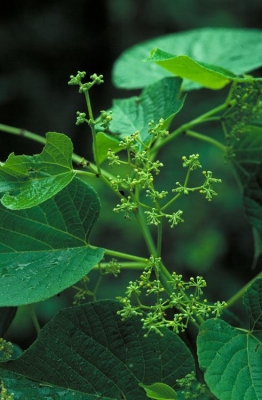Cissus adnata
Roxb.
Vitaceae
Vitis adnata (Roxb.) Wall.
Common Name:
General Information
Cissus adnata is a deciduous, slender, climbing shrub producing stems 5 - 15 metres long[
310- Title
- Plant Resources of Southeast Asia
- Publication
-
- Author
-
- Website
- http://proseanet.org/
- Publisher
-
- Year
- 0
- ISBN
-
- Description
- Lots of information on the uses of the plants of SE Asia.
]. The stems either scramble over the ground or climb into surrounding vegetation for support, attaching themselves by means of tendrils[
310- Title
- Plant Resources of Southeast Asia
- Publication
-
- Author
-
- Website
- http://proseanet.org/
- Publisher
-
- Year
- 0
- ISBN
-
- Description
- Lots of information on the uses of the plants of SE Asia.
].
The plant is sometimes harvested from the wild for local use as a food, medicine and source of cordage.
Known Hazards
None known
Botanical References
266- Title
- Flora of China
- Publication
-
- Author
-
- Website
- http://flora.huh.harvard.edu/china/
- Publisher
- Missouri Botanical Garden Press; St. Louis.
- Year
- 1994
- ISBN
-
- Description
- An excellent, comprehensive resource in 25 volumes. In addition to the botanical information the flora also gives basic information on habitat and some uses. An on-line version is also available.
Range
E. Asia - southern China, Indian subcontinent, through southeast Asia to Indonesia, Papua New Guinea and northern Australia.
Habitat
Semi-deciduous thickets close to beaches, monsoon forest and open forest, usually on well-drained soils[
310- Title
- Plant Resources of Southeast Asia
- Publication
-
- Author
-
- Website
- http://proseanet.org/
- Publisher
-
- Year
- 0
- ISBN
-
- Description
- Lots of information on the uses of the plants of SE Asia.
].
Properties
| Edibility Rating |      |
| Medicinal Rating |      |
| Other Uses Rating |      |
| Habit | Climber |
| Height | 10.00 m |
| Cultivation Status | Wild |
Cultivation Details
The plant usually grows wild on sandy to sandy loams, but is sometimes found on lateritic or calcareous soils[
310- Title
- Plant Resources of Southeast Asia
- Publication
-
- Author
-
- Website
- http://proseanet.org/
- Publisher
-
- Year
- 0
- ISBN
-
- Description
- Lots of information on the uses of the plants of SE Asia.
].
Edible Uses
Leaves - cooked and eaten as a vegetable[
310- Title
- Plant Resources of Southeast Asia
- Publication
-
- Author
-
- Website
- http://proseanet.org/
- Publisher
-
- Year
- 0
- ISBN
-
- Description
- Lots of information on the uses of the plants of SE Asia.
].
Medicinal
The root is alterative, diuretic and blood purifier[
310- Title
- Plant Resources of Southeast Asia
- Publication
-
- Author
-
- Website
- http://proseanet.org/
- Publisher
-
- Year
- 0
- ISBN
-
- Description
- Lots of information on the uses of the plants of SE Asia.
]. A cold infusion of the pounded root is taken as a treatment for cough[
310- Title
- Plant Resources of Southeast Asia
- Publication
-
- Author
-
- Website
- http://proseanet.org/
- Publisher
-
- Year
- 0
- ISBN
-
- Description
- Lots of information on the uses of the plants of SE Asia.
].
Applied externally, the powdered root is heated and used as a poultice on cuts and fractures[
310- Title
- Plant Resources of Southeast Asia
- Publication
-
- Author
-
- Website
- http://proseanet.org/
- Publisher
-
- Year
- 0
- ISBN
-
- Description
- Lots of information on the uses of the plants of SE Asia.
].
The juice from the stem is taken as a treatment for cough and diarrhoea[
310- Title
- Plant Resources of Southeast Asia
- Publication
-
- Author
-
- Website
- http://proseanet.org/
- Publisher
-
- Year
- 0
- ISBN
-
- Description
- Lots of information on the uses of the plants of SE Asia.
].
Externally the leaves are applied as a poultice for the maturation of boils[
310- Title
- Plant Resources of Southeast Asia
- Publication
-
- Author
-
- Website
- http://proseanet.org/
- Publisher
-
- Year
- 0
- ISBN
-
- Description
- Lots of information on the uses of the plants of SE Asia.
].
Other Uses
The stem is commonly used for cordage.
Propagation
Seed -
If you have any useful information about this plant, please leave a comment. Comments have to be approved before they are shown here.




 Useful Tropical Plants Database 2014 by
Ken Fern,
web interface by
Ajna Fern
with help from
Richard Morris.
Useful Tropical Plants Database 2014 by
Ken Fern,
web interface by
Ajna Fern
with help from
Richard Morris.